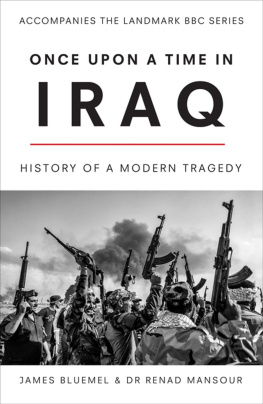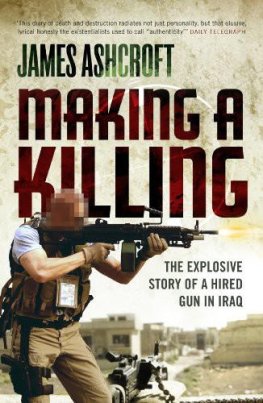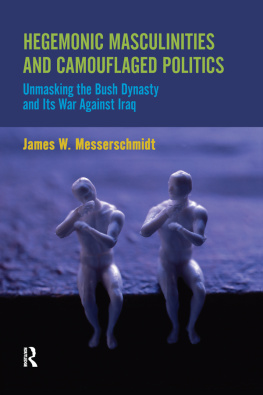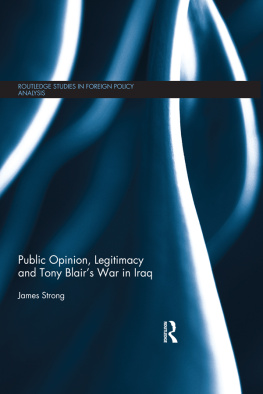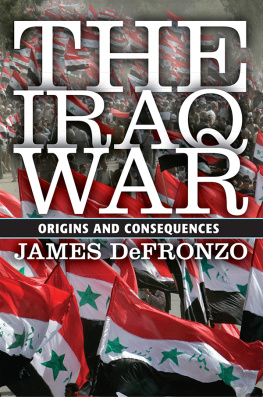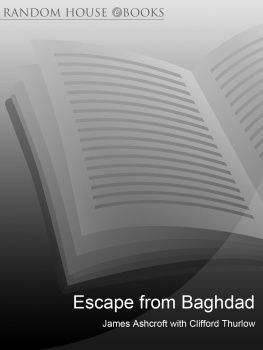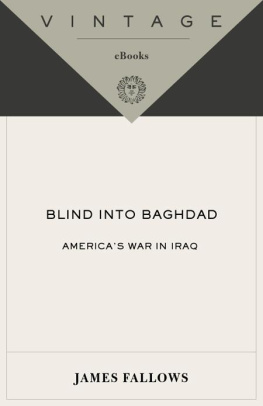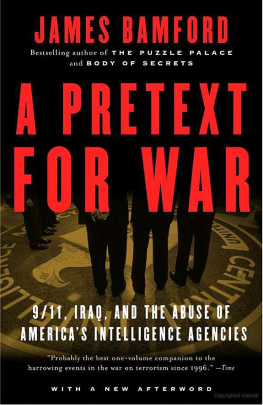James Bluemel - Once Upon a Time in Iraq
Here you can read online James Bluemel - Once Upon a Time in Iraq full text of the book (entire story) in english for free. Download pdf and epub, get meaning, cover and reviews about this ebook. year: 2020, publisher: Ebury Publishing, genre: Politics. Description of the work, (preface) as well as reviews are available. Best literature library LitArk.com created for fans of good reading and offers a wide selection of genres:
Romance novel
Science fiction
Adventure
Detective
Science
History
Home and family
Prose
Art
Politics
Computer
Non-fiction
Religion
Business
Children
Humor
Choose a favorite category and find really read worthwhile books. Enjoy immersion in the world of imagination, feel the emotions of the characters or learn something new for yourself, make an fascinating discovery.
- Book:Once Upon a Time in Iraq
- Author:
- Publisher:Ebury Publishing
- Genre:
- Year:2020
- Rating:3 / 5
- Favourites:Add to favourites
- Your mark:
- 60
- 1
- 2
- 3
- 4
- 5
Once Upon a Time in Iraq: summary, description and annotation
We offer to read an annotation, description, summary or preface (depends on what the author of the book "Once Upon a Time in Iraq" wrote himself). If you haven't found the necessary information about the book — write in the comments, we will try to find it.
Once Upon a Time in Iraq — read online for free the complete book (whole text) full work
Below is the text of the book, divided by pages. System saving the place of the last page read, allows you to conveniently read the book "Once Upon a Time in Iraq" online for free, without having to search again every time where you left off. Put a bookmark, and you can go to the page where you finished reading at any time.
Font size:
Interval:
Bookmark:
James Bluemel and Dr Renad Mansour
ONCE UPON A TIME IN IRAQ

Contents
About the Author
JAMES BLUEMEL is an Emmy and BAFTA award winning filmmaker. His landmark documentary series Exodus: the Journey to Europe and the follow up series, The Journey Continues were both broadcast on the BBC and PBS Frontline and charted the journeys refugees as they fled their homes and tried to find asylum in Europe. Filmed over 4 years it won the BAFTA for Director Factual 2017.
DR RENAD MANSOUR is Research Fellow in the Middle East and North Africa Programme at Chatham House. Prior to joining Chatham House, he was an EI-Erian fellow at the Carnegie Middle East Centre, where he examined Iraq, Iran and Kurdish affairs. He is also a research fellow at the Cambridge Security Initiative based at Cambridge University, and from 2013 he held positions as Lecturer of International Studies and Supervisor at the Faculty of Politics, also at Cambridge. Since 2011 he has been a senior research fellow at the Iraq Institute for Strategic Studies in Beirut and was adviser to the Kurdistan Regional Government Civil Society Ministry between 2008 and 2010. He received his PhD from Cambridge University.
Preface
Back in 2003, nobody really understood the extraordinary gamble taken by America and Britain when they invaded Iraq. Most people expected an easy victory. That was a grave mistake. This book is about that mistake and the ramifications it continues to have for people in Iraq and the West, still living in its tumultuous aftermath.
All the main political players and their advisers have already gone on record with their version of events, and their excuses. There is nothing new to say about any of that. This book takes a different approach. It focuses on the stories of the soldiers, civilians and journalists who were caught up in the war. It looks at how the war changed them as individuals and also, by extension, how it went on to change the world.
Some of the people interviewed were in the military. Others were ordinary civilians. All of them lived through the horrors of the war, and their actions were dictated by the extreme situation they found themselves in. Almost half the people I spoke to were Iraqi. Their perspective is fascinating, vital and, until now, rarely heard in the West.
As with Berlin after the fall of the Wall, the recent events of Baghdad encapsulate a moment of history which is somehow bigger than the city itself. Baghdad had once been a cosmopolitan and liberal city. Old film footage shows neatly laid-out streets, delicate and intricate architecture, cafs, open spaces and public gardens carefully planted with flowers. These are not the images that spring to mind today when you mention Baghdad. Today, the scenes that form in our collective imagination are filled with violence, shattered and broken buildings, car bombs tearing the city and its people apart. We imagine a broken and bleeding city freshly wounded by war. This is the version of Baghdad that emerged after the fall of Saddam Hussein.
I spent six weeks in Baghdad in the winter of 2018 during a rare period of calm in a city still ravaged by conflict. It felt as if the city was slowly re-emerging from the horrors of the past 15 years. There was a tentative sense of optimism on the streets. It was readable on peoples faces, but especially on that of Ammar, my Iraqi fixer. Proud to be showing me around his home city, he pointed out with relief and excitement the many roads that had until recently been blocked to the public by huge slabs of concrete and old blast walls. These monolithic barriers littered the city, blocking both traffic and pedestrians. There were many roads like this in Baghdad, that could not be used, forcing the rest of the city to suffer and suffocate under the strain of the extra congestion that these barriers created. Their removal was not just symbolic of safer times but, as Ammar said, It has given new air to the city, we can breathe again.
I had first visited Iraq in 2016, when I was halfway through a three-year project documenting the refugee crisis in Europe. At the time ISIS were in Mosul, and I wanted to meet Yezidi refugees in the northern city of Duhok. My team and I handed out dozens of mobile phones to migrants and refugees attempting to travel to Europe. We asked them to film the bits of their journeys which no other camera crews could access: the perilous boat crossings from Turkey to Greece, the lawless desert runs across the Sahara to Libya, the lorry-jumpers breaking into the Eurostar terminal in Calais, the people fleeing ISIS.
We produced six hours of television for BBC Two, in a series called Exodus . It told the stories of some of the migrants and refugees, who were all seeking a better life in Europe, in their own words. It was at times harrowing, of course, but there were many surprising and life-affirming moments. I was prepared for and expecting to witness upsetting scenes, to hear horrific stories of death, destruction and sadness. And I did see and hear all of that. But what I was not expecting was the hope, humour and undeniable resilience of the human spirit.
At the end of that project, I felt the need to try and make sense of the world we are living in today; a world where it has become normal for millions of people to flee their countries in the Middle East because of escalating conflicts, prolonged war, economic ruin and the rise of Islamic terrorism. Where did this all start? Following the domino trail of cause and effect back from the present, I arrived at an interesting and provocative juncture in history which I believe holds the key to understanding our current times: the decision to remove Saddam Hussein from power. The ramifications of that decision have been shaping our world ever since.
There are many places at which to start this story. For some, it might begin in 1979, when Saddam Hussein became president of Iraq. One of his first acts as president was to execute anyone in the Baath party whom he considered disloyal. Anyone who has seen the grainy black-and-white video of this event, showing people being dragged from their seats, taken outside and shot, will understand the sense of theatre Saddam employed in conjuring the spectre of fear that he relied on to rule. For some the story might start later, with the indiscriminate chemical attack in Halabja, a town in Iraqi Kurdistan. Mustard gas along with other nerve agents was used on the town, killing nearly 5,000 people, most of them civilians, many of them children. For others, it might be the collective punishment he threw at the Shia after the 1991 uprising, which killed thousands and displaced many others. This list could go on and on. There are countless events of cruelty, torture and murder which took place in Saddams Iraq, any of which would be cause enough to wish for the dictators removal.
In the West, the journey for many starts with 9/11, when al-Qaeda purposefully crashed two planes into the World Trade Center in New York, killing thousands of American civilians. Iraq should not be connected to 9/11, but it is. There was no evidence linking Saddam Hussein to the attacks, but a theoretical link was proposed and repeated by the Bush administration. This theorising may have stopped short of a definitive statement of fact, but only just. For many Americans, the repeated utterance of a link between the attacks and Saddam cemented a connection, and gave a much-needed target for blame and a focus for revenge.
The idea of removing Saddam Hussein from power had been kicked around various American administrations since the late 1980s, but it was only after 9/11 that it was finally acted upon and the case for war was made. We were told that, by removing Saddam, the world would become a safer place. We were told that he was evil and addicted to weapons of mass destruction. We were told that an invasion of Iraq would stop this evil tyrant, who had already gassed thousands of his own people. We were told that removing the despot would stop him fulfilling his dream of turning his evil intentions towards the West. We were told that a pre-emptive strike on Iraq was the only way to halt Saddams plans to unleash a huge armoury of nuclear, chemical and biological weapons that were primed and aimed, ready to fire at the West. We were told that a war in Iraq would stop his plans to collaborate with al-Qaeda to unleash ever more deadly terrorist attacks against our freedom and democracy. We were told that Saddams removal would release Iraqis from his tyrannical rule and create a democratic and free Iraq, a grateful and helpful partner in the Middle East.
Next pageFont size:
Interval:
Bookmark:
Similar books «Once Upon a Time in Iraq»
Look at similar books to Once Upon a Time in Iraq. We have selected literature similar in name and meaning in the hope of providing readers with more options to find new, interesting, not yet read works.
Discussion, reviews of the book Once Upon a Time in Iraq and just readers' own opinions. Leave your comments, write what you think about the work, its meaning or the main characters. Specify what exactly you liked and what you didn't like, and why you think so.

